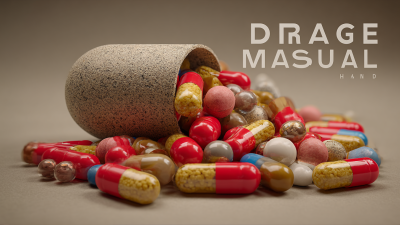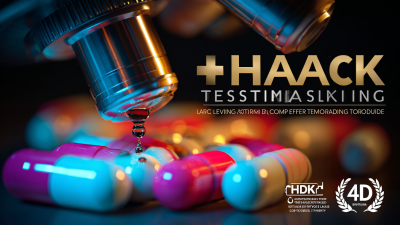
5 Innovative Drug Capsule Materials Transforming the Pharmaceutical Industry
 The pharmaceutical industry is experiencing a significant transformation driven by advancements in
drug delivery systems, particularly through
innovative drug capsule materials.
According to a report by Grand View Research, the global capsule market is projected to reach
USD 26.90 billion by 2025, reflecting a
compound annual growth rate (CAGR) of 6.2%.
This growth underscores the increasing reliance on drug capsule materials that enhance
bioavailability, improve patient compliance,
and enable targeted drug release. As the industry seeks to meet the demands for more efficient,
patient-friendly medications, five groundbreaking drug capsule materials have emerged at the
forefront of this evolution. These materials not only offer unique benefits over traditional capsules
but also pave the way for the development of novel therapeutics, ultimately
revolutionizing the way medications are formulated
and delivered.
The pharmaceutical industry is experiencing a significant transformation driven by advancements in
drug delivery systems, particularly through
innovative drug capsule materials.
According to a report by Grand View Research, the global capsule market is projected to reach
USD 26.90 billion by 2025, reflecting a
compound annual growth rate (CAGR) of 6.2%.
This growth underscores the increasing reliance on drug capsule materials that enhance
bioavailability, improve patient compliance,
and enable targeted drug release. As the industry seeks to meet the demands for more efficient,
patient-friendly medications, five groundbreaking drug capsule materials have emerged at the
forefront of this evolution. These materials not only offer unique benefits over traditional capsules
but also pave the way for the development of novel therapeutics, ultimately
revolutionizing the way medications are formulated
and delivered.
Impact of Biodegradable Materials on Reducing Pharmaceutical Waste in Drug Capsuling
The pharmaceutical industry is witnessing a dramatic shift towards sustainability, largely driven by the adoption of biodegradable materials in drug capsule production. Traditional capsules, often made from gelatin or synthetic polymers, contribute significantly to pharmaceutical waste. In contrast, innovations such as plant-based polymers and other eco-friendly alternatives are making a tangible impact, reducing the environmental footprint associated with medication consumption.

Biodegradable capsules are not only environmentally friendly but also align with the growing consumer demand for sustainable products. By breaking down naturally in the environment, these materials help mitigate the accumulation of pharmaceutical waste that poses risks to ecosystems and public health. This shift towards using renewable resources not only enhances the brand image of pharmaceutical companies but also encourages a circular economy where materials are reused and recycled, ultimately benefiting both consumers and the planet.
As the industry continues to embrace these innovative materials, the potential for reducing waste while maintaining efficacy in drug delivery becomes increasingly promising. The integration of biodegradable materials in drug capsules marks a crucial step towards making pharmaceutical practices more environmentally responsible, paving the way for an industry that values sustainability as much as it does innovation and efficacy.
Emerging Polymeric Materials Enhancing Drug Delivery Efficiency in Capsule Formulations
Emerging polymeric materials are revolutionizing the pharmaceutical industry by significantly enhancing drug delivery efficiency in capsule formulations. Recent studies indicate that the use of advanced polymers can improve bioavailability and facilitate targeted delivery, addressing longstanding challenges in pharmacokinetics. For example, poly(lactic-co-glycolic acid) (PLGA) has shown promise in sustaining drug release, allowing for prolonged therapeutic effects while minimizing side effects. According to a 2023 report from MarketsandMarkets, the global smart polymers market, driven by such innovations, is projected to reach $3.2 billion by 2025, growing at a CAGR of 18.2%.
Moreover, the incorporation of stimuli-responsive polymers in capsule designs has gained traction. These materials can respond to specific environmental triggers—such as pH or temperature—enabling the release of pharmaceuticals at precise locations within the body. Research published in the Journal of Controlled Release highlights that formulations utilizing these polymers can increase the efficacy of treatments for chronic conditions like diabetes and cancer by improving the release profile of active compounds. As the demand for tailored therapies continues to rise, the integration of these innovative polymeric materials holds the potential to transform how medications are delivered, paving the way for more effective and patient-centric healthcare solutions.
5 Innovative Drug Capsule Materials Transforming the Pharmaceutical Industry
| Material Type | Key Properties | Applications | Advantages |
|---|---|---|---|
| HPMC (Hydroxypropyl Methylcellulose) | Biodegradable, Controlled release | Oral solid dosage forms | Improved patient compliance |
| Gelatin | Biocompatible, Thermosensitive | Soft and hard capsules | High drug loading capacity |
| Polylactic Acid (PLA) | Biodegradable, Polymorphic | Long-acting formulations | Sustained drug release |
| Chitosan | Natural polymer, Antimicrobial | Targeted drug delivery | Enhanced absorption |
| PVA (Polyvinyl Alcohol) | Water-soluble, Non-toxic | Injectable drug formulations | Versatile for various drugs |
Smart Capsules: How Intelligent Drug Delivery Systems are Revolutionizing Patient Care
Smart capsules are at the forefront of revolutionary changes in patient care, thanks to advancements in intelligent drug delivery systems. These innovative drug capsules are designed to release medication in a controlled manner, precisely when and where it is needed. By integrating various technologies such as sensors and micro-robots, smart capsules can monitor a patient's condition in real-time, enabling personalized treatment regimens. This ensures that medications are delivered effectively, minimizing side effects and maximizing therapeutic outcomes.
Moreover, these intelligent systems offer significant improvements in patient compliance. Traditional pill regimens can be challenging for patients due to forgetfulness or misunderstanding dosage instructions. Smart capsules, equipped with digital connectivity, can send reminders and alerts directly to a patient's smartphone, ensuring timely intake of medications. Some advanced models even provide feedback to healthcare providers, allowing for immediate adjustments to treatment plans based on the patient's response. This level of interaction not only enhances the effectiveness of treatments but also fosters a proactive approach to health management, ultimately transforming the landscape of pharmaceutical care.
5 Innovative Drug Capsule Materials Transforming the Pharmaceutical Industry
This chart shows the market adoption rate of five innovative drug capsule materials that are transforming the pharmaceutical industry. The data indicates that Hydrogel has the highest adoption rate among these materials.
Nanotechnology in Capsule Design: Improving Bioavailability and Drug Stability
Recent advancements in nanotechnology have significantly impacted pharmaceutical capsule design, particularly in improving bioavailability and drug stability. A 2022 report from the International Journal of Pharmaceutics highlights that nanoparticles can enhance the solubility of poorly water-soluble drugs by up to 90%, addressing one of the key challenges in drug delivery. By employing nanocarriers, pharmaceutical companies can ensure that drugs reach their intended target more effectively, reducing the dosage needed and minimizing potential side effects.
Furthermore, nanotechnology enhances the stability of drugs within capsules, protecting them from degradation caused by environmental factors such as heat and humidity. According to a study published in the Journal of Controlled Release, nanostructured materials can extend the shelf life of certain formulations by 50% or more. This advancement not only contributes to more effective pharmacotherapy but also reduces waste in pharmaceutical production. As the industry continues to embrace these innovative materials, we can expect more efficient therapies that revolutionize treatment outcomes for patients worldwide.

The Role of Personalized Medicine in Shaping Future Capsule Material Innovations
The advancement of personalized medicine is profoundly influencing the development of innovative drug capsule materials. As treatments become more targeted to individual patient profiles, capsule materials are evolving to enhance drug delivery mechanisms and ensure optimal efficacy. For instance, the use of nanomaterials allows for tailored drug release profiles that align with a patient's specific metabolic rate, thereby improving therapeutic outcomes. This shift not only ensures that the right dosage is delivered at the right time but also minimizes side effects by avoiding unnecessary exposure to the active ingredients.
Furthermore, the integration of biocompatible and biodegradable materials is reshaping the landscape of capsule development. These innovations cater to the growing demand for sustainable solutions within the pharmaceutical industry while simultaneously meeting the needs of patients with divergent reactions to traditional materials. Personalized medicine is at the forefront of these advancements, encouraging pharmaceutical companies to prioritize individualized approaches in their research and development. This ultimately leads to a future where drug capsule materials are customized, paving the way for more effective and patient-friendly therapies.
Related Posts
-

5 Reasons Why Our Drug Capsule Material Stands Out in the Global Market
-

How to Choose the Best Drug Capsule Material for Your Pharmaceutical Needs
-

Navigating Issues with Sourcing Best Pharmaceutical Chemical Powder in a Competitive Market
-

What You Need to Know About Raw Powder for Your Global Supply Chain
-

How to Choose the Best Medicine Capsule Material for Your Pharmaceutical Needs
-

Evaluating Leading Pharmaceutical Testing Providers: A Comprehensive Comparison Guide
